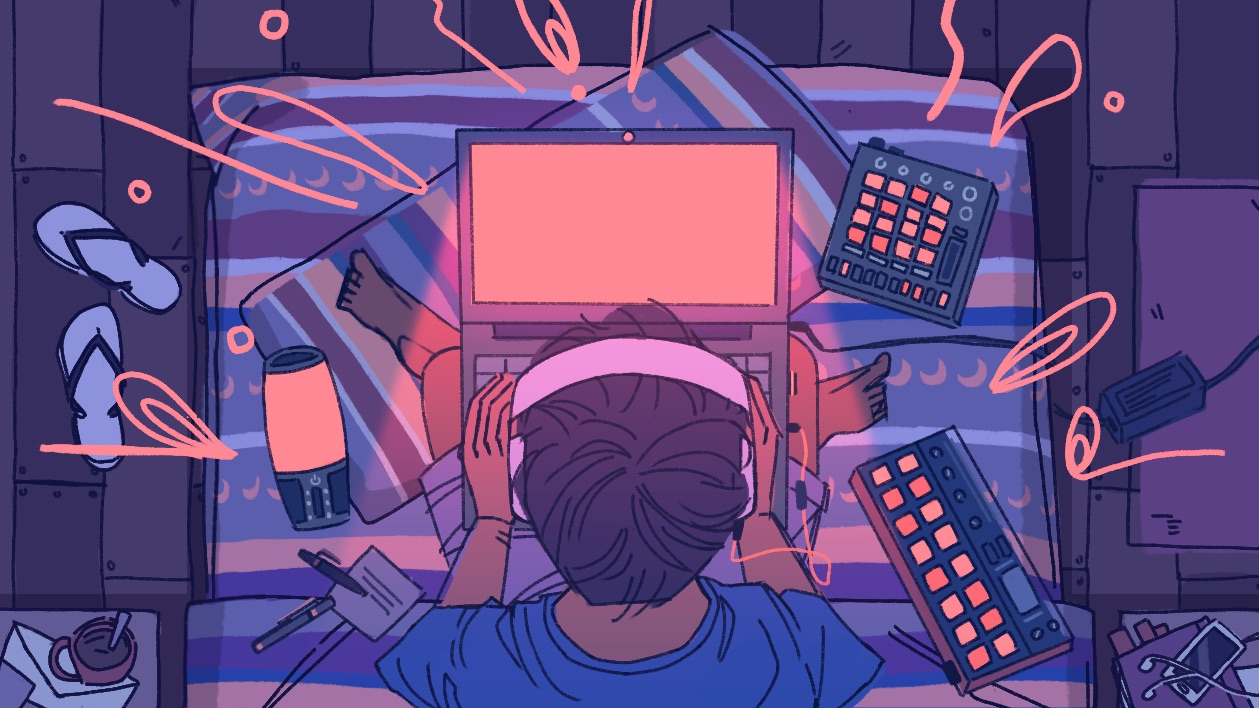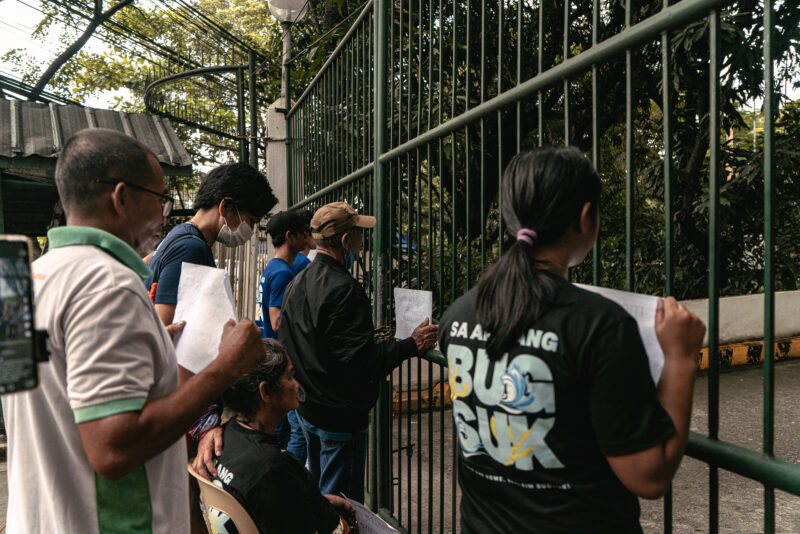If you happen to catch any gig around the metro, it’s likely you’d come across one or two acts that don’t make use of the usual band equipment; instead, you’d find them pressing on calculator-looking machines, paired with laptops placed on tables. With the onslaught of technological advancements, performances featuring these artists are only expected to increase and become a norm on the stage.
The local music scene has been ever-growing and evolving. Performers are no longer held back by their capability (or incapability) of playing a musical instrument, nor by the limitations of being a solo act. This stems from the rise of producers who continually redefine the gig scene, and pave the way for various sub-genres of music such as bedroom pop, vaporwave, lo-fi hip hop, and many more to catch a bigger audience.
One of many
Much like for any other musician, genre influences can vary. With this, a handful of future-funk, vaporwave, and 24/7 lo-fi beats to study to, can attribute to the rise of the internet culture. Electronic music such as these are characterized by the combined influences of jazz, R&B, hip-hop and the like, tweaked to create a whole different entity.
Moe Cabral, also known as “youngsleepyboi” (stylized as youngsleepyboi), is a vaporwave and future-funk producer who has been performing and making music since 2015. He talks about the internet not only as a tool to get his desired sounds, but also as a source of inspiration in developing his craft. He explains that these sub-genres that have surfaced from internet culture have been around for quite a while, but have only garnered attention in recent years.
“People just want to be nostalgic, and through these [rising genres], they let it out,” he says, explaining why he thinks lo-fi is one of the more popular internet genres among his generation.
The emergence of internet culture has allowed electronic producers to get creative with the way they produce; using unconventional methods to make unique sounds that define them as artists.
A testament to this is Javier Pimentel, also known as “lui.”, a lo-fi and hip-hop beatmaker who makes use of vinyl samples in order to create his own distinct sound in ways an electric guitar cannot. He describes making his beats as a sort of “music collaging,” wherein he chops up songs, often from Asian vinyls, and reconstructs them; merging various elements from these tracks to form something entirely different.
He also describes his unconventional music-making process and interest towards vintage vinyls from different eras. “It’s super interesting that we have an array of ethnic, [and] 60s and 70s music […] It’s really interesting when people try and bring it back to life and discover culture,” he explains.
With the rise of the internet culture and the massive following these sub-genres have garnered, emerged an idea that has been heavily influenced by these.
“Bedroom beats” is a term that Pimentel would use to describe tracks, whole EPs or extended play records, demos, and albums that are recorded within the confinements of one’s bedroom. Producer Jorge Wieneke (also known as “similarobjects”) adds that it has “a strong DIY feel to it, [and] it debunks the myth that you need [a] sophisticated and complicated studio set-up to create dope music.”
What sets bedroom beats apart is the notion of making music as accessible and plausible for electronic producers with just the use of various softwares. “It’s a scene that’s very inclusive of all these emerging new styles and genre mutations, and I feel [it] is a push to create new cultures in musical expression […] It is more the heart and spirit of these movements than the actual styles [or] genres that make the whole bedroom beats movement a thing,” Wieneke continues.
The redefined music scene
lui.’s current success in honing his craft never came to him on a silver platter. It involved a lot of hands-on learning and a passion-driven mindset to be able to perform regularly in clubs such as Black Market and XX:XX, as well as bars like Route 196 to get his music around. Two years ago, he joined workshops held by Cosmic Sonic Arts under Wieneke’s supervision, and eventually became a part of his collective.
Over the years, producers and artists alike have created communities that further cemented their impact on the local gig scene. In 2012, Wieneke, alongside other electronic artists, decided to form a collective where producers were given equal chances to share their inner worlds; showcasing members’ talents whether as a label, a production outfit, or a satellite for Filipino electronic music.
Wieneke’s BuwanBuwan Collective coined its name from the ancient traditional Filipino game buwanbuwan, where players take turns becoming “taya” or “it” as a way to enact a lunar eclipse. This concept acts as the very driving force and principle of the collective as a whole by serving as an avenue for each artist to receive a spotlight through organizing gigs, formulating workshops, and curating playlists.
“We’re not out to impose what’s cool and what sounds good; we’re out to give everyone a chance to share and discover new music straight from the bedrooms of DIY electronic producers all over the country,” Wieneke explains.
Labelling BuwanBuwan as one of the pioneers of local electronic music, Pimentel explains that the collective has always been inclusive of artists with music of all types, bounded by a common denominator. “For some reason, it all just connects,” he adds.
The future at hand
Electronic music producers have been around the local music scene for quite a while, but it was only until recently that their presence was more noticed and regarded as at par with bands and what others would deem as “real musicians.”
To Wieneke, the perception towards electronic producers has greatly changed over the years. Back then, he would receive negative judgements for not using conventional instruments in his live performances. “I used to even experience being booed off stage for using a laptop or a Gameboy at a gig. I think that says a lot [about] how much things have actually improved since [then].”
Similarly, Cabral explains the contrast between these perceptions and shares his mantra of respect between artists who differ in music-making facets. “Back then, people would judge you if you were just an electronic producer, and you [didn’t] know how to play an instrument. Now, it’s like kids as young as 12 [or] 13 get introduced with the DJing and producing [aspect], and [that’s] okay […] Let’s respect each other. This is my forte; this is my instrument. You do you with your guitar, and I’mma do me with my laptop.”
Ever since the BuwanBuwan Collective was established, the community has continually been growing in numbers. Along with BuwanBuwan and a handful of other collectives is an audience that continues to expand as well. Following the Bedroom Beats stage in the most recent annual Fête de la Musique, held at Agimat Bar in Poblacion Makati last June 23, Pimentel, Wieneke and Cabral all have observed the rise in support for their event, having pulled off a jam-packed venue.
“[We] started from playing empty to small shows, to now being able to fill up venues and host our own Fête stages for a few consecutive years,” Wieneke explains.
The challenge for the future of electronic producers in the local gig scene now lies in finding innovative ways to continue piquing the interest of its already established audience. “The struggle is keeping people interested and cultivating [a] culture of open-mindedness for years to come,” says Wieneke.
“The game is changing, and the possibilities are endless,” he ends.
What do you think about this story? Send your comments and suggestions here: tgdn.co/2ZqqodZ







